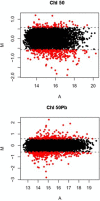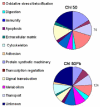Chloroquine mediated modulation of Anopheles gambiae gene expression
- PMID: 18596975
- PMCID: PMC2432468
- DOI: 10.1371/journal.pone.0002587
Chloroquine mediated modulation of Anopheles gambiae gene expression
Abstract
Background: Plasmodium development in the mosquito is crucial for malaria transmission and depends on the parasite's interaction with a variety of cell types and specific mosquito factors that have both positive and negative effects on infection. Whereas the defensive response of the mosquito contributes to a decrease in parasite numbers during these stages, some components of the blood meal are known to favor infection, potentiating the risk of increased transmission. The presence of the antimalarial drug chloroquine in the mosquito's blood meal has been associated with an increase in Plasmodium infectivity for the mosquito, which is possibly caused by chloroquine interfering with the capacity of the mosquito to defend against the infection.
Methodology/principal findings: In this study, we report a detailed survey of the Anopheles gambiae genes that are differentially regulated by the presence of chloroquine in the blood meal, using an A. gambiae cDNA microarray. The effect of chloroquine on transcript abundance was evaluated separately for non-infected and Plasmodium berghei-infected mosquitoes. Chloroquine was found to affect the abundance of transcripts that encode proteins involved in a variety of processes, including immunity, apoptosis, cytoskeleton and the response to oxidative stress. This pattern of differential gene expression may explain the weakened mosquito defense response which accounts for the increased infectivity observed in chloroquine-treated mosquitoes.
Conclusions/significance: The results of the present study suggest that chloroquine can interfere with several putative mosquito mechanisms of defense against Plasmodium at the level of gene expression and highlight the need for a better understanding of the impacts of antimalarial agents on parasite transmission.
Conflict of interest statement
Figures


Similar articles
-
Effect of chloroquine on gene expression of Plasmodium yoelii nigeriensis during its sporogonic development in the mosquito vector.Malar J. 2007 Jul 2;6:84. doi: 10.1186/1475-2875-6-84. Malar J. 2007. PMID: 17605769 Free PMC article.
-
Effect of chloroquine on the expression of genes involved in the mosquito immune response to Plasmodium infection.Insect Biochem Mol Biol. 2005 Oct;35(10):1124-32. doi: 10.1016/j.ibmb.2005.05.003. Insect Biochem Mol Biol. 2005. PMID: 16102418
-
Modulation of Anopheles stephensi gene expression by nitroquine, an antimalarial drug against Plasmodium yoelii infection in the mosquito.PLoS One. 2014 Feb 24;9(2):e89473. doi: 10.1371/journal.pone.0089473. eCollection 2014. PLoS One. 2014. PMID: 24586804 Free PMC article.
-
Comparative and functional genomics of the innate immune system in the malaria vector Anopheles gambiae.Immunol Rev. 2004 Apr;198:127-48. doi: 10.1111/j.0105-2896.2004.0127.x. Immunol Rev. 2004. PMID: 15199960 Review.
-
The rise and fall of malarial sporozoite rates in Anopheles gambiae s.l. and An. funestus in north-eastern Tanzania, between 1934 and 1999.Ann Trop Med Parasitol. 2001 Jun;95(4):325-30. doi: 10.1080/00034980120055526. Ann Trop Med Parasitol. 2001. PMID: 11454241 Review.
Cited by
-
Hemozoin activates the innate immune system and reduces Plasmodium berghei infection in Anopheles gambiae.Parasit Vectors. 2015 Jan 8;8:12. doi: 10.1186/s13071-014-0619-y. Parasit Vectors. 2015. PMID: 25573379 Free PMC article.
-
Quest for malaria management using natural remedies.Front Pharmacol. 2024 Jun 26;15:1359890. doi: 10.3389/fphar.2024.1359890. eCollection 2024. Front Pharmacol. 2024. PMID: 39011507 Free PMC article. Review.
-
Age and mating status do not affect transcript levels of odorant receptor genes in male antennae of Heliothis virescens and Heliothis subflexa.J Chem Ecol. 2010 Nov;36(11):1226-33. doi: 10.1007/s10886-010-9863-6. Epub 2010 Oct 5. J Chem Ecol. 2010. PMID: 20890796
-
GeCoNet-Tool: a software package for gene co-expression network construction and analysis.BMC Bioinformatics. 2023 Jul 11;24(1):281. doi: 10.1186/s12859-023-05382-1. BMC Bioinformatics. 2023. PMID: 37434115 Free PMC article.
-
An expression map for Anopheles gambiae.BMC Genomics. 2011 Dec 20;12:620. doi: 10.1186/1471-2164-12-620. BMC Genomics. 2011. PMID: 22185628 Free PMC article.
References
-
- Vlachou D, Kafatos FC. The complex interplay between mosquito positive and negative regulators of Plasmodium development. Current Opinion in Microbiology. 2005;8:415–421. - PubMed
-
- Peiris JS, Premawansa S, Ranawaka MB, Udagama PV, Munasinghe YD, et al. Monoclonal and polyclonal antibodies both block and enhance transmission of human Plasmodium vivax malaria. Am J Trop Med Hyg. 1988;39:26–32. - PubMed
-
- Lopes LF, Abrantes P, Silva AP, do Rosário VE, Silveira H. Plasmodium yoelli: the effect of second blood meal and anti-sporozoite antibodies on development and gene expression in the mosquito vector, Anopheles stephensi. Exp Parasitol. 2007;115:259–69. - PubMed
-
- Ichimori K, Curtis CF, Targett GA. The effects of chloroquine on the infectivity of chloroquine-sensitive and –resistant populations of P.yoelii nigeriensis to mosquitoes. Parasitology. 1990;100:377–381. - PubMed
-
- Hogh B, Gamage-Mendis A, Butcher GA, Thompson R, Begtrup K, et al. The differing impact of chloroquine and pyrimethamine/sulfadoxine upon the infectivity of malaria species to the mosquito vector. Am J Trop Med Hyg. 1998;58:176–182. - PubMed
Publication types
MeSH terms
Substances
Grants and funding
LinkOut - more resources
Full Text Sources

